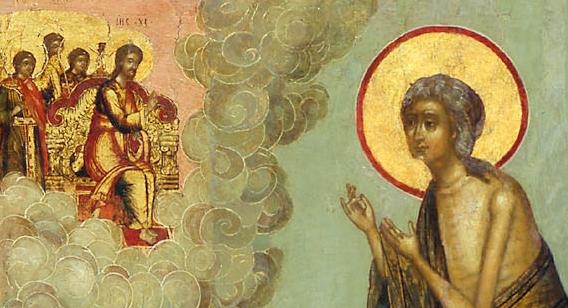Homily on the 5th Sunday of Great Lent by Archbishop Andrei (Rymarenko, 1893-1978)

“This kind can come forth by nothing, but by prayer and fasting (Mk. 9:29). So if you will remember, last Sunday, the fourth Sunday of Great Lent, the Gospel proclaimed to us: “This kind can come forth by nothing, but by prayer and fasting.” What is “this kind’? If you will remember, brothers and sisters, we were told there about a youth who was possessed and sometimes fell into fire and sometimes into water, as his father said when he brought him to Christ. And Christ said, ‘This kind can come forth by nothing, but by prayer and fasting.” This is what kind. The kind which possessed the youth and was casting him down. This unfortunate youth not only knew no rest, but not even life itself. And Christ said, “can come forth’ This means that it was something separate. Now, do we understand this or not?
Brothers, if you just open a newspaper, you will at once understand what “this kind” means. See how many people who, in a state of despair, jump into water in order to end their lives, thinking there is no eternal life. And into the fire. Here you find so many who again, out of despair, throw themselves into fire, become human torches in order to burn themselves. It is the same thing: a state of insanity or despondency, or on the contrary, a state of mind which almost reaches madness — human pride. And how many people become victims of those terrible excesses of sex. How many terrible mental conditions there are in which a person commits robbery, murder, which are connected with the terrible greed for money, for power. What is this? It is precisely “this kind.” We seem not to participate in it. Oh, if only we would not participate!
Now we are in the period of life which we call spiritual spring. If a farmer is late in sowing, then there will be no harvest and, therefore, no bread. Likewise, if a person is late in acquiring sobriety, attention to his inner man, his heart, then he will be left without spiritual nourishment, in spiritual hunger. And if there is some kind of passion in his heart and he realizes it, then he will also understand that no one can drive out this passion except He Who created man. But for this to happen, preparation is needed. And this preparation is fasting and prayer.
We should have remained with such feelings during the past week. And if we possessed the state of mind which a Christian should possess, then during this fifth week, when the Church was crying: “O Lord, before I perish to the end, save me,” when the Canon of St. Andrew of Crete was being read, which exposes and overturns our heart and reveals to us such passions; it would be possible for us to approach God and say: “O God, forgive me, heal me, give me Thine everlasting light; give me Life, because maybe I have only one year left to live, and maybe not even that; I might be going to Thee right now.”
We are all going there into eternity; and the Church gives us this time for preparation, in order to look at ourselves, so that we might acquire the forces necessary for entering eternal existence.
The Church said to us in the last Gospel that this kind is driven out by fasting and prayer. We think that fasting is when we have vegetable oil on the table. Yes, certainly limitation in food is also fasting. But fasting does not consist of this alone; this is only part of fasting. Fasting is when a person opens his heart in such a way that he sees what is unneeded and rejects it, keeping only what is needed in order to preserve his heart. And prayer? Prayer > the state in which our soul, sensing Divine peace, unceasingly calls to the Lord; “Help me; don’t let it happen. don’t allow the murder of the most important feeling within me — conscience.”
And here at the end of this week, I don’t know about you, but I still have a feeling of being unworthy. And for me, today is a great comfort. In what sense? Here before us, before our spiritual eyes, stands Mary of Egypt. This was a sinner who became a classic type, a classic image of a Christian woman. She was an outrageous courtesan of Alexandria in Egypt. She was a harlot; she was a prostitute; she was a beauty, and her depravity knew no limits.
Once she chanced to see a crowd of people boarding a ship. And she, not in order to go to Palestine, but in order to be active in her profession among the pilgrims, she also boarded this ship. And so she sailed to Jerusalem. She went with the crowd to worship the Cross of the Lord. Why not? The whole crowd was going and so she went too. And here, when the crowd had entered the vestibule of the church; then here, no matter what Mary did, she could not enter the church. By now almost everyone had entered, but she was somehow nailed to the floor. It was as if a gust of wind or a wave threw her out and drove her away. No matter how she trembled, no matter how eager she was to enter, she could not; something would not let her. Finally, she understood that some kind of terrible force would not let her in. And here she looked up: before her was a face; it was the icon ‘of the Mother of God with the Child. Immediately the curtain which covered up her conscience was opened. She had heard about Christ and she had heard that Christ called to chastity. And here her conscience revealed to her all her sin, and she fell before the Heavenly Queen with this cry: “Forgive me, help!”
And then she herself did not see or understand what happened. All at once, as if lifted by wind, she was brought into the church and she fell down before the Cross of the Lord. And here a miracle happened to her: there appeared in her the thirst for purity, for chastity. She wanted to feel the lightness of a clean conscience. And when she felt forgiveness, without looking around and without any provisions, she rushed to the Jordan, walked through it, and then disappeared into the desert.
And so for seventeen years, she lived in a state of sobriety; and as she said later, she had to bite the ground in order to destroy lustful feelings, carnal longings, the demonic bodily movements of “this kind.” And later on, for seventeen more years she praised God’s Grace. She was like an angel.
Therefore, I say that for us this day which the Church puts before us is a comfort. There is no sinner whom the Lord would not forgive. Brothers and sisters, without doubt, every one of us will be covered by the lid of a coffin. Every one of us will disappear into the grave. And the soul will pass over into eternity. What will be there? Do we ever think about what will be there? The Church is calling and calling us to repentance. But how do we start? Now pay attention to this: Mary could not enter the Church; somebody was not letting her in. Look at yourself, at your conscience. The same happens to you; somebody is not allowing you to surrender fully to Christ. Stop this. But how? In the same way, Mary did — rush to the Mother of God.
This is what I am asking you to do. This is the greatest joy. And rush to the Lord and say, “Lord, help me to be Christian. Help me, so that the motion of my heart beats out just one feeling: surrender to the Lord, fulfillment of His commandments. Then a clear, bright spring will come. And approaching Easter we will hear the words of Christ, “Peace be unto you!” (Lk. 24:36). May this peace rest in you.





